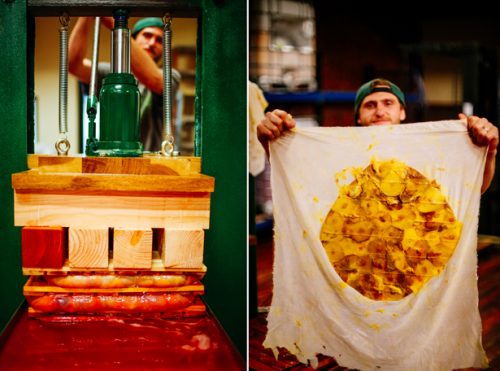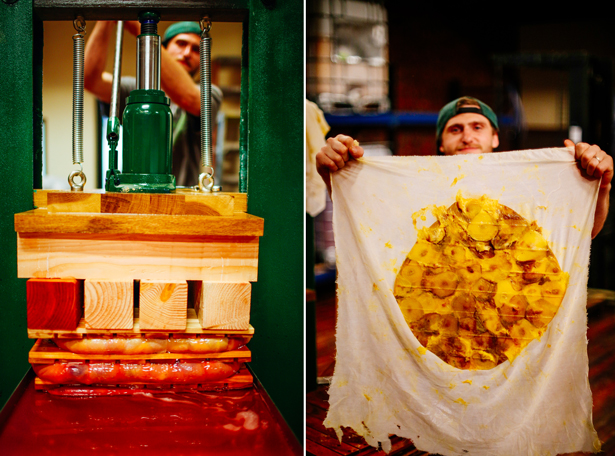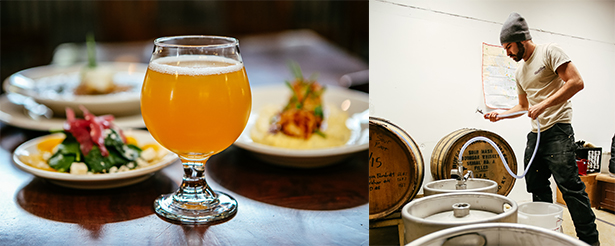
There’s no shortage of ciderhouses in Portland, and now the Willamette Valley is jumping onboard the fruit-filled trend. Some hit the market early: 2 Towns Ciderhouse, which opened in Corvallis in 2010, is now expanding its craft cider sales to Alaska, Idaho and Nevada. And some, such as WildCraft Cider Works and Elk Horn Brewery, opened just last year, offering their brand new apple-y goodness to the people of Eugene.
 |
|
Pressing locally harvested plums on a hand-built press at Wildcraft Cider Works. Plums on a cloth filter after pressing. Photos by Trask Bedortha.
|
But if you think cider is confined to apples alone, think again. These cider makers are using pears, blackberries, ginger, elderberries, hops and other surprising ingredients to whip up delicious fermented fruit concoctions, bound to tempt even the most loyal of craft beer devotees. Step up to the tap, Eugene, and get your cider on.
WildCraft Cider Works
Cider maker Sean Kelly sees potential in the abandoned orchards and berry patches of Lane County — in fact, he seeks them out. “Open your eyes, and you will see them everywhere,” says Kelly, who opened WildCraft Cider Works near 4th and Lincoln last month.
Kelly started out in the salvaged wood business, reusing unwanted wood to build furniture and spiral staircases. He brewed and fermented on the side, but the idea of salvaging fruit and turning it into dry, hard cider beckoned to him. “I guess the idea of WildCraft is a conglomeration of all the loves in one,” Kelly says.
WildCraft Cider Works aims to promote sustainable agriculture by revitalizing old orchards instead of relying primarily on commercial orchards. Kelly says that WildCraft harvests from orchards planted up to 150 years ago — one key orchard is at Cheviot Hill Sheep Farm near Pleasant Hill, where pioneer Elijah Bristow built his first homestead. It’s one of many Lane County orchards planted by pioneers in the 1800s and more or less left to its own devices.
“Really, it’s about creating a cleaner product that is more exhibitive of the natural orchards that we’re harvesting,” Kelly says. “Some of these are old colonial varietals that are not grown commercially. In about four months, we’ve been able to make 10 different ciders, and we have five more in production.”
Gail Gould, who owns Cheviot Hill Sheep Farm, says that while the apple trees have been replanted over the years, some trees in her orchard are around 100 years old, producing apples traditionally used to make cider. “It’s really a true farmhouse-style cider,” Gould says, “and it’s closer to traditional French cider than English pub cider, which can be overly sweet.”
So what does a wild-crafted cider taste like? That depends entirely on the type of cider you’re trying, and there are quite a few.
WildCraft’s flagship dry cider is delightful and classic, not overly sweet, with a pleasant finish. Because WildCraft doesn’t backsweeten, or add sugar at the end of the fermentation process, “the whole thing comes alive,” Kelly says. “Your palette becomes drawn to these subtleties of taste.”
This goes for all of WildCraft’s ciders, from its wild plum small-batch cider, made with freeze-pressed Mirabelle plums, to its tart cherry cider, which uses Willamette Valley cherries fermented alongside apples.
But WildCraft’s perries, or pear ciders, are what really shine. Its Pioneer Perry glows with rich, warm and hearty flavors, not as sharp as a traditional apple cider. Kelly says the pears come from a select handful of pioneer orchards.
The elderberry perry, besides being fun to say, holds a unique taste, with the sweet fruitiness of Cottage Grove elderberries balancing the satisfying wholesomeness of the fermented pear.
WildCraft pairs its ciders with a tasteful, albeit higher-priced, menu, and Kelly says most of the menu items incorporate cider into the recipe. The cheese plate is exquisite: three wedges of cheese accompanied by local honey, fruit, walnuts and membrillo — a sweet, thick jelly.
Other offerings from Chef Ryk Francisco include savory truffle mac and cheese, housemade crepes with veggie, cheese or meat fillings and brochettes served with chewy flatbread.
Kelly says since opening the cider house in late November of last year, he’s seen clientele of every age and background enter the historic brick building on Lincoln Street near the Whiteaker neighborhood. With handcrafted, salvaged redwood tables and an old-time ambiance that’s hard to fake, WildCraft is well on its way to becoming a community staple.
And for the future? Kelly is dreaming big — rooftop dining with a spiral staircase. “On summer nights, it would be so awesome,” he says, smiling. “We’re working on it.”
Elk Horn Brewery
Stephen and Colleen Sheehan want you to know that Elk Horn Brewery is up and running, they now have a suite of housemade ciders and beers on tap and, no, they are definitely not a corporation.
“I feel like sometimes people look at us like we’re some kind of corporate infrastructure that came to Eugene when actually, no, we were a food cart,” explains Colleen Sheehan, co-owner of Elk Horn. “We scrapped and hustled and made this with our bare hands.”
“We’re the little guy for sure,” Stephen Sheehan adds.
Veterans of Eugene cuisine with their food cart Delacata, the wife-and-husband team opened Elk Horn Brewery in August, serving other local brews because they didn’t yet have official approval to make beer and cider.
Elk Horn held its grand opening on Jan. 20, and the Sheehans say they’re excited to show Eugene what their restaurant and brewery is all about.
With its neon-green logo and visible location on Broadway and Hilyard near the UO campus, the restaurant occupies an old Carl’s Jr. building, although you’d never know it after the remodel. The inside, with a roomy, split-level design, is an explosion of taxidermy: Mounted elk heads, antler light fixtures and posed bobcats fit the bill for Elk Horn’s theme of “Wild Oregon.”
And so does the menu. The food still reflects Delacata’s “Southern meets Northwest fusion” motto — savory hushpuppies, the most amazing chicken and waffles you’ve ever had, tasty desserts — but the expanded resources of a restaurant and brewery have allowed the Sheehans to broaden their scope, tapping into everything Oregon has to offer. And when it comes to cider, the Sheehans are full of ideas.
The 11 percent ABV dry cider is heady and sharp, pairing deliciously with crawfish pasta, and the blackberry cider brings gusts of summer-tinged flavors with each sip. Elk Horn’s organic cider apples come from Hood River in northern Oregon.
 |
|
Elk Horn Brewery's Deep Inn Cider. Elk Horn Brewery's brewmaster Sam Scoggin prepares to barrel age a new cider. Photos by Todd Cooper.
|
The Sheehans say that they’re the only ones in town who have a Randall system, a filter that infuses a base cider or beer with a flavor of the brewer’s choosing. For example, Stephen Sheehan says, “We could stuff that filter with cranberries and cinnamon, and then run the cider through it to create a cranberry cider.”
Colleen Sheehan says they plan to launch a botanical cider series in the spring. “We really want to incorporate everything you can find or forage in Oregon, from yarrow to nasturtium to honeysuckle,” she says.
Stephen Sheehan adds that he’d like to experiment with wild yeast ciders, drawing from the yeast that grows naturally on the skin of the apple.
The Sheehans and their brewmaster, Sam Scoggin, are headed to the Kona Brewers Festival in Hawaii this March, and later this year, they’re planning on adding wildflower honey mead to their list of fermented delights.
You can’t get Elk Horn’s brews in bottles yet, but that’s because they’re flying out of the taps in the restaurant. “We’ll distribute, but right now we can’t keep up with the volume we’re selling in-house,” Stephen Sheehan says. “We have at least two or three businesses a week calling to get our cider on tap. But we’ve got to be able to sell it here first!”
2 Towns Ciderhouse
It only makes sense that a ciderhouse employing a high percentage of redheads would produce a hard cider called Ginga Ninja. “We decided we really needed to come up with a cider that was representative of the gingers at 2 Towns, and that’s kind of what got the idea started,” explains 2 Towns CEO Lee Larsen.
Hard apple cider with fresh-pressed ginger juice is only one of the creative combinations that flows from 2 Towns’ tap. Since EW first chatted with 2 Towns in 2013, the ciderhouse has grown, experimenting with alternative flavors while expanding its offerings to other states.
“2014 was a really exciting year for us,” Larsen says. The ciderhouse expanded its production facility, added seven new employees and nurtured its estate orchard in Corvallis, getting it ready for its first major harvest this year.
2 Towns released Ginga Ninja as a seasonal cider, but Larsen says the gingery and refreshing drink will soon be available year-round, due to its popularity. Other seasonals include Cherried Away, a crisp, tart beverage, Made Marion, sweet and fruity, and Rhubarbarian, a quirky mix of sharp rhubarb and delicious apple.
And then there are 2 Towns’ limited releases, which give the cider makers a chance to explore their creativity.
“One of the really cool things about living here in Oregon and the Pacific Northwest in general is the insane diversity of super high-quality produce,” Larsen says, and that diversity inspires the cider makers to try new things. “In our pursuit to push the bounds of cider, every single person here is always coming up with ideas.”
Larsen says 2 Towns keeps a bulletin board where anyone on staff can pin their ideas for new cider combinations and flavors. Such openness spawned limited releases of Cot in the Act, an apricot cider with tasty citrus, and Cidre Muscato, yummy, sweet and wine-like with the addition of muscat grapes.
“We created the limited-release line so that we could experiment,” Larsen says. “The craft beer mentality that exists in Oregon is so strong, and people always want to try new things, so limited releases allow us to do that but at the same time rotate different flavors through.”
Up next in the limited-release lineup is Bourbon Honey Special Sauce, a hard cider made with Oregon honey and aged in bourbon barrels — look for it sometime this March.
Larsen says that the 2 Towns Ciderhouse Tap Room, located just outside of Corvallis off OR-34, recently underwent an expansion, with 14 house ciders on tap, foosball tables and live music on the weekends. The tap room isn’t big on food but offers cheese plates, meat plates, bread and hummus.
For a few years, 2 Towns has considered adding a taphouse in Eugene, since the name “2 Towns” refers to Corvallis and Eugene. “It’s been a high priority for a while, and we’re still looking for possibilities down there,” Larsen says. “We haven’t found that right spot yet, but it’s still something we’re thinking about.”
And just because 2 Towns is expanding, Larsen says, doesn’t mean the ciderhouse is headed for mass produced commercialism. “Our intention is to continue to advance the craft and, a lot of times, having more people, ideas and equipment can really help that evolution rather than hinder.”
WildCraft Cider Works is located at 390 Lincoln St. and is open 4 pm to 11 pm Tuesday through Thursday and 3 pm to midnight Friday through Saturday.
Elk Horn Brewery is located at 686 E. Broadway Street and is open 11 am to 10 pm Tuesday through Thursday, 11 am to 11 pm Friday and Saturday and 9 am to 9 pm Sunday.
2 Towns Ciderhouse is located at 33930 SE Eastgate Circle in Corvallis and is open noon to 6 pm Tuesday through Wednesday, noon to 8 pm Thursday through Saturday and noon to 5 pm Sunday.